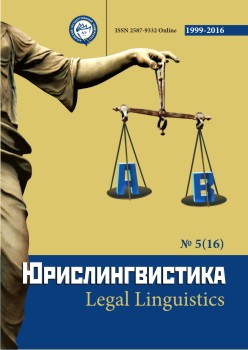LAW OFFENSES CAUSED BY QUARRELING AS REFLECTED IN THE LEGAL DOCUMENTS OF KIEVAN RUS IN THE PERIOD OF THE FEUDAL FRAGMENTATION
Abstract
The conceptual and terminological apparatus of Russian law in the field of offenses connected with verbal conflicts has passed through numerous stages of formation and rethinking. At the discussed initial stage in the formation of the legal framework, it is difficult to expect those concepts and terms that we meet in modern legislation, characteristic of civil and legal society. Concepts and terms do not yet have strict definitions; often interpretations of the same concept in a context can not only differ, but also contradict each other in some way. However, the analysis induced the following conclusions:
- understanding of the person's intangible rights begins to form and becomes legally recorded, when the damage can be inflicted not only physically, but also morally, which is reflected in the concept of “dishonor”;
- the types of damage to the intangible rights of the person appear and become recorded, among which the main place is occupied various types of "assault and battery", with the awareness of the offenses committed through the use of language units already beginning to form;
- the main type of violations related to verbal conflicts becomes "slander," that means understanding of the denotative and significative space, of objective and subjective reality and responsibility for statements that do not refer to the situations of reality, but claim to do so.
Downloads
Metrics
References
«Памятники русского права», Выпуск первый. М., 1952г., 304с.
«Памятники русского права», Выпуск второй. М., 1953г. 443с.
«Памятники русского права», Выпуск третий. М., 1955г. 529с.
REFERENCES
"Monuments of Russian Law", Issue one [«Pamjatniki russkogo prava», Vypusk pervyj]. Moscow, 1952.
"Monuments of Russian Law", Issue two [«Pamjatniki russkogo prava», Vypusk vtoroj]. Moscow, 1953.
"Monuments of Russian law", Issue three [«Pamjatniki russkogo prava», Vypusk tretij]. Moscow, 1955.
Copyright (c) 2017 Юрислингвистика

This work is licensed under a Creative Commons Attribution 4.0 International License.
The authors, which are published in this journal, agree to the following conditions:
1. Authors retain the copyright to the work and transfer to the journal the right of the first publication along with the work, at the same time licensing it under the terms of the Creative Commons Attribution License, which allows others to distribute this work with the obligatory indication of the authorship of this work and a link to the original publication in this journal .
2. The authors retain the right to enter into separate, additional contractual agreements for the non-exclusive distribution of the version of the work published by this journal (for example, to place it in the university depository or to publish it in a book), with reference to the original publication in this journal.
3. Authors are allowed to post their work on the Internet (for example, in a university repository or on their personal website) before and during the review process of this journal, as this may lead to a productive discussion, as well as more links to this published work (See The Effect of Open Access).










